|
|
|


Theobald Wolfe TONE (1763 - 1798) Although his father worked in Dublin, the family belonged to Co. Kildare. Theobald Wolfe Tone was born in Dublin into a middle-class Protestant family. He was the eldest of nine children. His father was a successful coach-builder and small property-owner, though by no means a member of the Ascendancy class, and young Theobald grew up in very comfortable circumstances at first. Later, Wolfe Tone's father apparently neglected his business, and the family fell on harder times. In Co. Kildare his grandfather, William Tone, rented a farm in the immediate vicinity of Bodenstown. The landlord was a Mr. Wolfe of Blackhall,(in the same parish); and Theobald Wolfe Tone seems to have been fostered into this family and named after one of the children to whom he was a foster brother. Wolfe Tone was exceptionally intelligent as a child, with a highly developed sense of humour. He was educated first at home, then at a liberal private school. As a schoolboy he already had a passion for politics and for debates; but his main childhood ambition was to be a soldier (like his younger brother). After an angry dispute with his father, however, he was enrolled in Trinity College, at the age of eighteen. 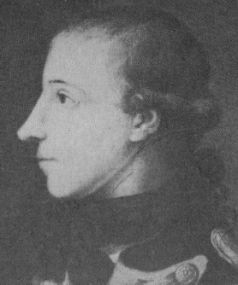 Being a Protestant, and of mercurial disposition, he entered Trinity College Dublin, where his collegiate career, though colourful, was undistinguished. He was well received in Dublin society, in spite of his comparatively humble birth. Tone's first essay in politics, was a scheme for the advancement of English power in the South Pacific Ocean; the bitter hatred of England which would shape Tone's destiny in later life having not yet manifested itself. Prime Minister Pitt's rebuttal of his plans so embittered Wolfe Tone that his mien became one of hostility towards England. During the 1780's he also served as a tutor, at one point for the children of Richard Martin who would later be known as "Humanity Dick". Rumors later stated that Tone was possibly the father of one of Richard Martin's children. 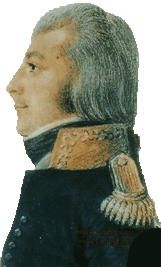 His subsequent formation of the United Irishmen plunged him into a clandestine world of revolutionary agitation. It was only through the intercession of his influential friends that he escaped Crown prosecution, on the condition that he went to America. Instead he decided to go to France where he sought the assistance of the French Directory in bringing about the deliverance of Ireland. From the outset Wolfe Tone had enthusiastically embraced the principles of the French Revolution and had become a free-thinker in matters religious and a republican in politics. However, his new task proved at first disheartening as he landed in France ignorant of the language and devoid of means. With patience, tact, and by exploiting the deadly hatred to England felt by the French revolutionaries, he eventually succeeded in procuring their assistance for his carefully considered plans. 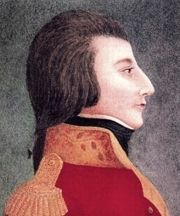 Tone's attempted risings: On December 15th, 1796 an expeditionary force of fourteen thousand men under General Hoche, sailed from Brest intending to effect a landing in the South of Ireland. Wolfe Tone departed jubilantly bearing a commission in the French Army. However a series of storms, not unlike those which decimated the Spanish Armada, dispersed the French fleet, just off the Irish coast. Fourteen days after the expedition had started orders were given for its return to France, having accomplished nothing. In 1798 a small force under General Humbert set sail and succeeded in landing at Killalla Bay on August 22nd, but after fleeting success they were surrounded by English troops, and on September 8th, his forces surrendered. Among the prisoners was Wolfe Tone's brother, Matthew, who was tried, executed, and buried at Bodenstown. Another expedition embarked on December 20th, 1798, ignorant of the Humbert disaster, and after twenty days arrived off Lough Swilly. The following day it was attacked and defeated by an English fleet under Sir Borlase Warren. Tone who had actively participated in the fighting was made prisoner, tried by court martial on November 10th and sentenced to death. As Wolfe Tone had never held a Commission in the English Army his trial by court martial was blatantly illegal, and his sentence was a travesty of justice. During the debacle of his court martial Wolfe Tone made no defence, merely acknowledging his part in the rising. He requesting only that since he bore a commission in the French Army, he might suffer death as an officer and not by the hangman. Appeal was therefore made to prevent Tone from undergoing the ignominy of a public hanging. By strange coincidence, the judge before whom the appeal came was Lord Kilwarden, a member of the Wolfe family with which Tone was externally connected. Kilwarden granted a writ suspending the execution, however upon its arrival at the prison it was discovered that Wolfe Tone had severely wounded himself the night before with a pen-knife he had secreted upon his person. He lingered painfully for a few days before dying on November 19th, 1798. His remains were removed to Bodenstown, and buried in the grave which had just received the body of his brother Matthew. 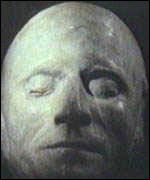 The headstone has since been slowly dismembered by enthusiastic pilgrims, who have removed pieces to serve as relics. Even the slab erected by the Wolfe Tone Band has been summarily subjected to similar treatment. It is perhaps fitting however that this imperfect and battle scarred memorial to Wolfe Tone should have inspired generations afterwards to vindicate his legacy and implement his vision of freedom.  The ruined church of Bodenstown, with it's overgrown graveyard stands in the rolling pasturelands of Kildare, which stretch between the Wicklow hills and the Bog of Allen. For well over a century no inconsiderable number of pilgrims have journeyed to this innocuous graveyard to behold the headstone of Theobald Wolfe Tone. In the same vicinity, about four miles distant on the other side of the river, bordering the Bog of Allen, lies the village of Prosperous, where the Rebellion of 1798 broke out, and where the aspirations of Wolfe Tone were manifested, violently enacted and brutally quelled, in the space of a few short weeks. 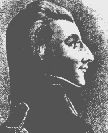 |
